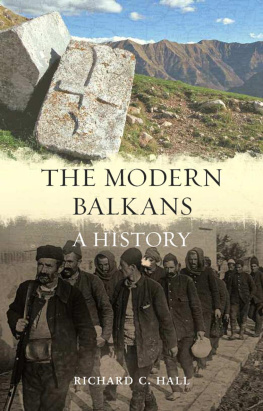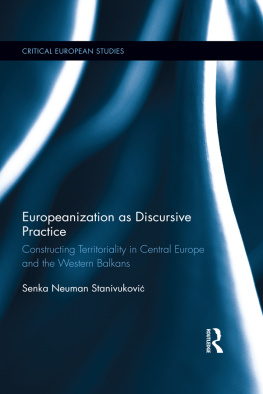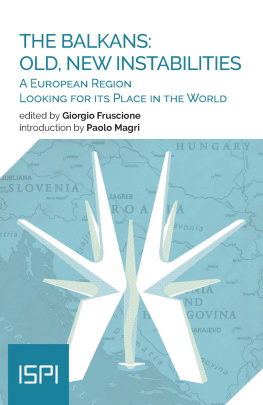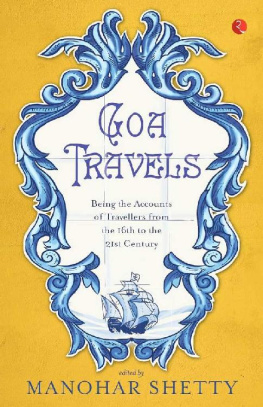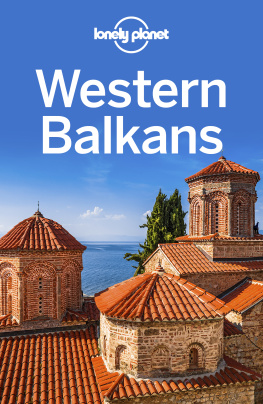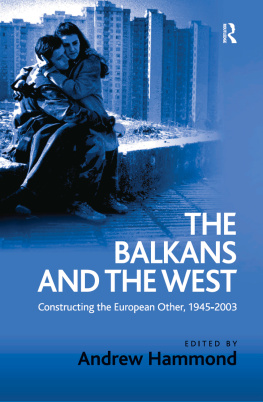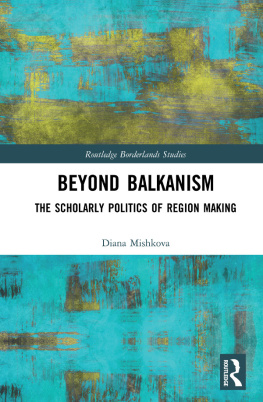Published in 2009 by
Berghahn Books
www.berghahnbooks.com
2009, 2011 Wendy Bracewell and Alex Drace-Francis
First paperback edition published in 2011
First ebook edition published in 2014
All rights reserved. Except for the quotation of short passages for the purposes of criticism and review, no part of this book may be reproduced in any form or by any means, electronic or mechanical, including photocopying, recording, or any information storage and retrieval system now known or to be invented, without written permission of the publisher.
Library of Congress Cataloging-in-Publication Data
p. cm.
Includes bibliographical references and index.
ISBN 978-1-84545-254-4 (hbk) -- ISBN 978-1-84545-788-4 (pbk) -- ISBN 978-1-84545-917-8 (ebk)
1. Travelers writings, East European--History and criticism. 2. East Europeans--Travel--Europe--History. 3. Travel writing--History. 4. Europe--Description and travel. I. Bracewell, Wendy. II. Drace-Francis, Alex.
PN849.E9T73 2009
809.935914--dc22
2009006003
British Library Cataloguing in Publication Data
A catalogue record for this book is available from the British Library
ISBN: 978-1-84545-254-4 (hardback)
ISBN: 978-1-84545-788-4 (paperback)
ISBN: 978-1-84545-917-8 (ebook)
CHAPTER 1
Balkan Travel Writing: Points of Departure
Wendy Bracewell
What is Balkan travel writing? The casual reader, browsing through shelves of travel accounts from the past hundred years or so, might reasonably assume that the phrase refers to travels to the Balkan peninsula. Any number of European and North American travellers published accounts of their Balkan journeys. The precise countries visited may vary the boundaries of the Balkans are notoriously ill-defined but the use of the generic label nonetheless implies a sense that the region is a unified and cohesive entity. The travellers titles and subtitles sum up the characteristics that they associate with the region as a whole: Land of Discord; Savage Europe; The Burning Balkans; Between Baedeker and Homer; Wild and Beautiful as well as The Melting Pot; Eternal Epic; Through the Iron-laced Curtain; The Other Europe; Prejudice and Plum Brandy; The Embers of Chaos.
In recent research on travel writing, the Balkans also most frequently appear as a region travelled to. In line with the current fascination with travel writings role in the workings of power, scholars have read Western travel accounts of the region for the way their authors construct a relationship between their own societies and those they describe a relationship usually based more on opposition than on similarity or connection. British, American or German travel writing about the Balkans revels in difference and the exotic, and particularly in violence or the primitive traits that serve (so critics tell us) as a foil to self-congratulatory definitions of the West as modern, progressive and rational. Such representations have promoted a sense of Western cultural superiority at the least, and at worst have justified self-interested political, military or economic policies towards the region. They have helped to set the region apart from Europe proper, on the basis of criteria selected by travellers looking more to the norms and interests of their own societies than to the attributes of the lands they travelled through; and they have bolstered the inequalities of political and economic power that hold such perceptions in place. Scholarship has characterized such travel writing as not just about the Balkans, but as Balkanist, contributing to a discourse of Balkan difference that is seen as pervasive, persistent and remarkably potent (most recently, Hammond 2007).
However, the Balkans is also a place that has long been travelled from. Travellers from the region have offered numerous accounts of their adventures in the West and elsewhere, saying something in the process about themselves and their place in the world. This selection of studies explores the literature of travel in Greek, Romanian, Bulgarian, Serbian and Croatian (and it might well have included several other literary traditions under the Balkan label). These studies approach such writing both on its own terms and in comparison with Western practices and discourses. The authors unravel some of the strategies and rhetorical devices behind images of the Other in both Balkan and Western travel writing, but the emphasis is less on recurring patterns than on specific contexts and interests. The studies show, through a variety of instances, some of the purposes to which these travel accounts could be bent social critique or reassurance, manifesto or introspection and they direct our attention to the ways travel writers attitudes, objects of attention and motives have shifted and changed. Rather than treating travel writing from a European periphery in terms of auto-ethnography or returning the gaze, as with Latin American travel writing that engages with the centres terms, in the language of the metropolis (e.g., Pratt 1992; Beardsall 2000), these essays focus for the most part on vernacular travel writing addressed to a domestic audience. Recognition of the asymmetrical relations between Vienna, Berlin, Paris or London and the states of the region puts the EastWest axis at the centre of much of the analysis, but these studies also suggest that the tendency to see self-definition in the region in terms of an all-encompassing EastWest polarization may be an optical illusion based on a narrow selection of sources, hinting, for instance, at the relevance of other relationships in other contexts: with Balkan neighbours; or with Russia, the farther East or the Third World. In short, this book constitutes something of a departure from existing scholarship, and one that offers innovative perspectives on both travel writing and the Balkans.
One advantage of grouping these studies together under a single, not entirely arbitrary heading is the stimulus to comparative analysis (something performed to a certain extent in all the studies collected here). This then suggests further avenues for research. Thus, for instance, Maria Kostaridou assesses the travel letters of a sixteenth-century Corfiote, Nikandros Noukios, against the apodemic instructions that defined the conventions of erudite sixteenth-century European travel writing, and against a variety of other contemporary Greek travel texts. Noukios accounts are distinguished by their scope and sophistication, as Kostaridou points out, but also by the language of composition, a formal, archaistic Greek accessible to international readers but also close to the vernacular. Other sixteenth- and seventeenth-century travellers from the region produced similar texts, derived from comparable experiences, in analogous social and intellectual environments, and deployed their travel observations for the same purposes of instruction and self-display; but they composed them in international literary languages, not in their own vernaculars for a domestic audience. This was the case for the escaped slaves who described their experiences for private circulation or for a wider market, whether in Latin, by those held in Ottoman captivity (e.g., Bartolomaeus Georgievits/orevi) or in Turkish, by an escaped Habsburg prisoner (Osman Aa of Temesvar); it was also the case for the embassy translator Benedict Curipeschitz/Kuripei, who travelled with an imperial embassy to Constantinople in 1530 and wrote in German, and the imperial ambassador and humanist scholar Antonius Verantius/Vrani, who described his 1553 journey to Constantinople in Latin; for the seventeenth-century missionary accounts of Ottoman Slavonia in Latin by the Croatian Jesuit Bartolomaeus Cassius/Kai; for the accounts of Mexico, by another such Jesuit, Ivan Rattkay, who reported in Latin and German; and for the Moldavian Nikolai Spafarii/Nicolae Spathar Milescu, Peter the Greats emissary to China in the 1670s, whose Russian-language travel notes were written for the Russian Foreign Ministry.



